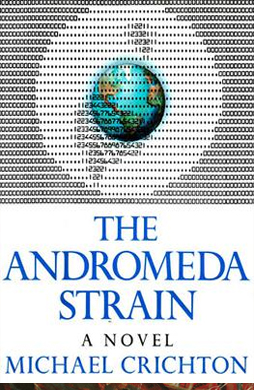
The Andromeda Strain by Michael Crichton
Michael Crichton consistently set a high mark for future fiction writers to surpass, and The Andromeda Strain was perhaps the best example of this. With a deceptively simple premise -- alien dust infects small town with disastrous results -- the book goes on to weave a tale of surpassing excellence, with action, suspense, and more than a little irony when the dangerous dust evades all attempts to contain it and flees back into the heavens from whence it came. However, in between the discovery of dozens dead in a small Arizona town to the final desperate escape from nuclear catastrophe, Crichton expertly balances heart-stopping action with top flight scientific analysis to deliver what many call his best novel ever.
About Michael Crichton
John Michael Crichton, son of an Advertising Age executive, began writing at age 14, publishing a travel piece in the New York Times. Accepted to Harvard, Crichton studied English and anthropology before applying to medical school, from which he graduated in 1969. Eschewing a career in medicine, however, he decided to follow up a few early publishing successes and become a full-time writer. The Andromeda Strain was his first critical and commercial achievement. He followed that book with yet another future fiction tale concerning electrode brain therapy gone wrong (The Terminal Man) and then tried his hand at a string of straightforward thrillers. In 1990 Crichton published the uber successful sci-fi adventure story, Jurassic Park, which famously raised the question on big screens around the world about genetic science’s apparent success at resurrecting dinosaurs. The question was not, Can we clone dinosaurs, but rather Should we clone dinosaurs? Turned out the answer to the first question was a scientifically satisfying yes, but the answer to the second was a gore-spattered no. After a long and reasonably successful stint in Hollywood as a screenwriter and producer, Crichton died in 2008, having achieved much in the way of bringing future fiction into the international spotlight. Like Jules Verne and other great future fiction writers before him, Michael Crichton predicted with the best of them, speculated with professional restraint, and projected what may be in our futures with uncanny accuracy.Futurist Themes:
- Limits of Human Intelligence
- Limits of Technology
© Copyright 2021. All Rights Reserved. | Made and Maintained by Virtual Crayon
